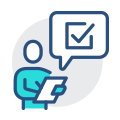
What are OKRs?
Objective & Key Results or, shortly, OKRs is one of the most important management methodologies within an organization. As a powerful tool, it helps teams and individuals set bold and ambitious goals with measurable benefits. OKRs help you track progress, create alignment, and drive commitment to measurable goals.
How do OKRs work?
Regardless of the organization's area of activity, OKRs function the same way in defining goals at any level of the organization.
A goal is what we intend to achieve. By definition, goals are meaningful, specific, and actionable. When integrated and properly implemented, they are the basis for clear thinking and correct execution.
Key Results analyze and monitor how we achieve our goals. The most effective Key Results are specific and set in a specific time frame, clearly outlined and achievable. Most importantly, they are measurable and verifiable. The path is the one that leads to meeting or not meeting the requirements of KRs, so there is no middle ground. During a given period of a project/task, a periodic review is conducted and the key deliverables are assessed as met or not met. If it’s a long-term goal, that takes place over a year or more, the key deliverables evolve just as the work itself does. Once they are all completed, the goal is considered achieved.
The main benefits of OKRs
1. Connect all employees to the company's goals.
2. Provide a clear direction for both teams and individuals.
3. Increase productivity by focusing on higher-level tasks and targeted objectives.
4. Track and permanently monitor the progress needed to achieve the goals.
5. Assist in an efficient, well-structured and informed decision-making process.
6. Create a measurement process, accountability and transparency at the organizational chart level.
7. Provide weekly updates to adjust directions.
8. Draw an overall picture and align progress on goals with the organization's vision, strategy and top priorities.
9. Stimulate time efficiency in setting clear and specific goals and objectives.
10. Increase employee engagement and capabilities.
11. Provide a structured analysis of the reasons why goals are not being met.
12. Help to better allocate and manage available resources.
13. Capture and store specific dysfunctionalities between teams.
Many organizations strive for fast growth and face various challenges that prevent them from aligning teams with the established mission, focus on objectives, followed by accountability. Co-Factor digital platform helped several top companies to successfully set and implement OKRs.
Through OKRs, one can manage to define very clear goals and choose a proper measurement scale, thus Co-Factor digital platform fully supports the performance management plan. Everything is based on permanent support, because employees have different needs depending on the project status, and the best results are achieved when the approach is established step by step.
Co-Factor digital platform reinforces teams’s structure, assists these teams to set meaningful, action-oriented goals, and also helps them to analyze data with the help of the automatically generated reports.





